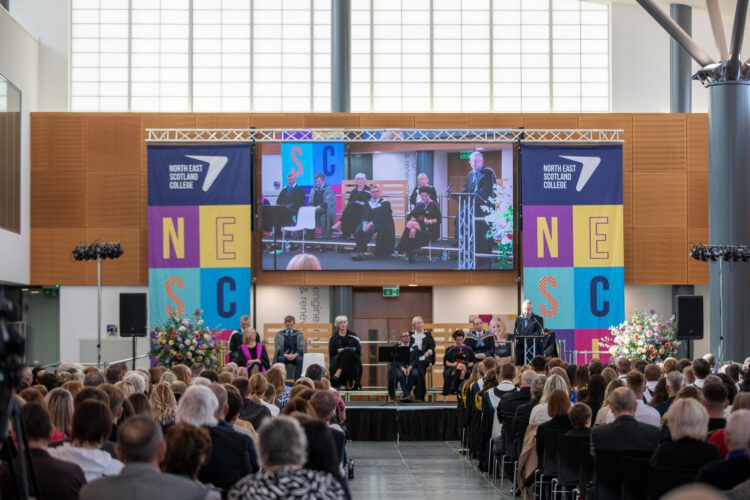New National Energy Skills Accelerator to be established in Aberdeen to support the UK energy transition
July 2, 2021
A new National Energy Skills Accelerator (NESA) is being established in Aberdeen to prepare the workforce for the energy transition and to provide access to new skills and capabilities required for delivering the net zero agenda.
The NESA will form part of the Energy Transition Zone in Aberdeen, which secured funding from both UK and Scottish Governments earlier this year. The Energy Transition Zone is an ambitious project that will reposition the North East of Scotland as a globally recognised integrated energy cluster focussed on the delivery of net zero that delivers sustainable jobs and growth for the region.
The NESA is a collaborative initiative between Robert Gordon University (RGU), the University of Aberdeen (UoA) and North East Scotland College (NESCol) and is supported by key regional partners, including Skills Development Scotland (SDS) and Energy Transition Zone Ltd (ETZ). It is anticipated that other partners may join NESA over time.
Acting as a collaborative umbrella organisation, the NESA will provide a ‘one stop shop’ for industry to access a wide range of energy courses, skills development programmes and R&D capabilities in the partner institutions.
It is expected that NESA will be established during 2021 and will be operational from 2022 onwards.
Commenting on the creation of the new National Energy Skills Accelerator, Paul de Leeuw, Chair of the NESA Development Board said:
“The energy transition will require the creation of a more flexible, more agile and more diverse energy workforce. With thousands of people to be new-skilled and re-skilled on an annual basis, NESA can play a critical role to ensure the industry has access to the key skills and capabilities required.
“Building on the 50+ year track record in each of the partner institutions, NESA will be able to support a wide range of organisation, both in the UK and globally. NESA will also play a key role to help the existing oil and gas workforce to prepare for emerging opportunities in adjacent energy sectors.
“NESA will act as a collaborative umbrella organisation, providing additionality and reducing duplication by enabling partners to work better with industry to promote, align and deliver skills development offerings and programmes responsive to industry needs.”
Professor Steve Olivier, Robert Gordon University Principal, commented: “The development of NESA is a very important step in ensuring that the region is equipped with the skilled professionals we will need as we take strides towards the country’s net zero ambitions.
“This is a great example of how industry and academia can work in collaboration for the benefit of our region and we are thrilled to be playing a key role in its delivery, working with partners across the business and Higher and Further Education sectors.”
Professor George Boyne, University of Aberdeen Principal, said: “We are delighted to collaborate with our key regional partners as part of NESA, as we aim to drive regional economic recovery and skills development as part of the net zero agenda.
“Through NESA we look forward to working with our industrial and higher and further education partners, as part of a collective effort to work for the benefit of our region and its economy.”
Neil Cowie, Principal and Chief Executive, North East Scotland College (NESCol) said: “We are delighted to be a central and critical partner in this exciting and innovative collaboration. NESA is an excellent example of partnership working at its very best and will, undoubtedly, assist us all in the short, medium and longer term to contribute successfully to the future recovery, transition and prosperity of the region’s economy.
“Through the NESA the College will – in conjunction with its tertiary education and business partners – be able to develop and deliver high quality training to enable the region to be, and remain at, the forefront of energy transition and global climate change.”
Chris Brodie, Director of Regional Skills Planning and Sector Development at Skills Development Scotland (SDS) said: “With the transition towards net zero picking up pace, the establishment of NESA is an important step for the industries which drive the regional economy.
“NESA is aligned with the Climate Emergency Skills Action Plan which sets out the skills measures required for Scotland to take advantage of the net zero opportunities in front of us.
“SDS is committed to working with partners to ensure people can build the skills they will need to succeed in this growing part of our economy throughout their career.”
Chief Executive of ETZ Ltd Maggie McGinlay said: “ETZ will support 2,500 direct jobs, with a further 10,000 energy transition-related jobs across the region. It is crucial we ensure we equip our current workforce and future generations with the skills necessary to take advantage of the wide range of opportunities energy transition will bring.
By leveraging the collective strengths of the region’s leading academic institutions and private sector training providers to enhance the skills of the existing world-class talent pool the National Energy Skills Accelerator will precisely achieve that.”








